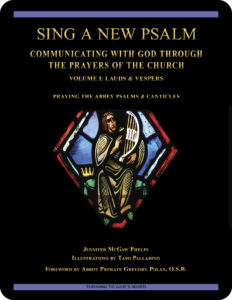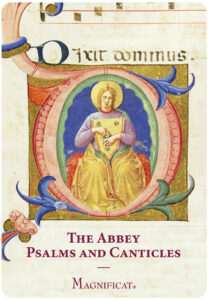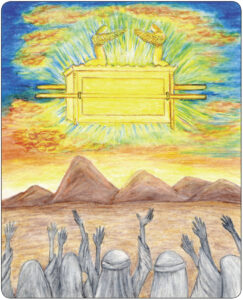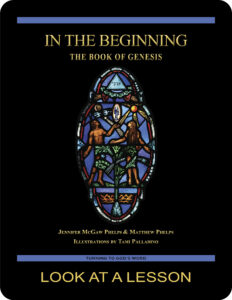 Sing a New Psalm:
Sing a New Psalm:
Communicating with God Through
the Prayers of the Church
Volume I: Lauds & Vespers
Lesson 21 May the LORD Bless You
Psalm 128, Psalm 131, Psalm 132, and Psalm 133
Tuesday Vespers (Week II)
Revised Standard Version Catholic Edition (RSVCE)*
New American Bible Revised Edition (NABRE)*
Catechism of the Catholic Church
ex libris (in our library)
next lesson: Teach Us to Number Our Days
This material coordinates with Lesson 21 on pages 86–89 in Sing a New Psalm: Communicating with God Through the Prayers of the Church—Volume I: Lauds & Vespers. Our Catholic Bible study is based on The Abbey Psalms and Canticles, an English translation of the Psalms prepared by the monks at Conception Abbey in 2010 and first published as The Revised Grail Psalms. The Abbey Psalms and Canticles is a revision of that work, finished in 2020 and published by the United States Conference of Catholic Bishops (USCCB). Wording and numbering of some Psalms and verses in other translations may differ. This new translation of the Psalms in the process of being added to all English-language Liturgy of the Hours books used in the United States. The USCCB also plans a liturgical Bible based on the NABRE translation.
The Abbey Psalms and Canticles, an English translation of the Psalms prepared by the monks at Conception Abbey in 2010 and first published as The Revised Grail Psalms. The Abbey Psalms and Canticles is a revision of that work, finished in 2020 and published by the United States Conference of Catholic Bishops (USCCB). Wording and numbering of some Psalms and verses in other translations may differ. This new translation of the Psalms in the process of being added to all English-language Liturgy of the Hours books used in the United States. The USCCB also plans a liturgical Bible based on the NABRE translation.
“Unlike other prayers in sacred Scripture, the prayers contained in the Psalms are not inserted into a narrative story that specifies their meaning and function. Instead, the Psalms are given to the believer precisely as a text of prayer. Since they are the Word of God, the believer who prays the Psalms speaks to God using the very words that God himself has given to us. Thus, in praying the Psalms we learn to pray. The Psalms are a school of prayer.”—Pope Benedict XVI
welcome to our in-depth study of the Psalms
We invite groups and individuals to check out the sample first lesson from this 28- lesson Turning to
lesson Turning to  God’s Word Catholic Bible study. Our online study pages include additional questions, commentary, and prayers based on the Psalm texts. Sing a New Psalm: Communicating with God Through the Prayers of the Church—Volume I: Lauds & Vespers has been granted an imprimatur. A digital version of this study can be purchased from our website shop. Volume II: Vigils, Day Prayer & Compline is scheduled for publication in 2025. If you have a Bible-related question or comment, click on one of the “ask us your question” or “what do you think” buttons on any online study page.
God’s Word Catholic Bible study. Our online study pages include additional questions, commentary, and prayers based on the Psalm texts. Sing a New Psalm: Communicating with God Through the Prayers of the Church—Volume I: Lauds & Vespers has been granted an imprimatur. A digital version of this study can be purchased from our website shop. Volume II: Vigils, Day Prayer & Compline is scheduled for publication in 2025. If you have a Bible-related question or comment, click on one of the “ask us your question” or “what do you think” buttons on any online study page.
open with prayer
It’s always wise to begin any Bible study with prayer, whether reading the Scriptures alone or meeting with others in a discussion study group. You can pray using your own words, pray one of the Psalms in this lesson, or use one of the opening prayers on our website. We especially like the following:
Lord Jesus, you promised to send your Holy Spirit
to teach us all things.
As we read and study your word today,
allow it to touch our hearts and change our lives. Amen.
blessing associated with the ark of the covenant
This illustration by Turning to God’s Word co-founder Tami Palladino emphasizes the connection between being blessed by God and following his law, symbolized by the ark of the covenant in which  the Israelites placed the tablets containing the Ten Commandments. The Old Testament ark of the covenant represents God’s dwelling on earth. Christians also refer to the Blessed Virgin Mary as the Ark of the Covenant. You can learn more about the links between Scripture and the prayers of the Rosary in our Catholic Bible study Scripture & the Rosary: New Testament Mysteries, Old Testament Parallels. No longer in print, free digital lessons from this popular study rotate year-round on our website based on the liturgical season. What connection do you see between these Old and New Testament understandings about the ark of the covenant? If following the law ensures God’s blessing, as is promised in many of the Psalms and throughout the Torah (the first five books of the Old Testament), why do you think it is that so many of God’s people failed to follow the law throughout salvation history? Consider why so many people in the present day choose not to follow God’s teachings. How would you explain Jesus’ moral teachings to someone who’s never been exposed to Christianity? Click on Tami’s illustration (above right) to enlarge it. Her original illustration is on page
the Israelites placed the tablets containing the Ten Commandments. The Old Testament ark of the covenant represents God’s dwelling on earth. Christians also refer to the Blessed Virgin Mary as the Ark of the Covenant. You can learn more about the links between Scripture and the prayers of the Rosary in our Catholic Bible study Scripture & the Rosary: New Testament Mysteries, Old Testament Parallels. No longer in print, free digital lessons from this popular study rotate year-round on our website based on the liturgical season. What connection do you see between these Old and New Testament understandings about the ark of the covenant? If following the law ensures God’s blessing, as is promised in many of the Psalms and throughout the Torah (the first five books of the Old Testament), why do you think it is that so many of God’s people failed to follow the law throughout salvation history? Consider why so many people in the present day choose not to follow God’s teachings. How would you explain Jesus’ moral teachings to someone who’s never been exposed to Christianity? Click on Tami’s illustration (above right) to enlarge it. Her original illustration is on page  87 in Sing a New Psalm: Communicating with God Through the Prayers of the Church—Volume I: Lauds & Vespers.
87 in Sing a New Psalm: Communicating with God Through the Prayers of the Church—Volume I: Lauds & Vespers.
WHAT DO YOU THINK about God’s blessing being communal?
Consider the many ways that other people are involved in your Catholic faith.
 ? Why do you that Psalm 84 and Psalm 85 in Lesson 20 The LORD God Is a Sun & a Shield focus attention on blessing for all of God’s people rather than just blessing for the individual Psalmist and his immediate community?
? Why do you that Psalm 84 and Psalm 85 in Lesson 20 The LORD God Is a Sun & a Shield focus attention on blessing for all of God’s people rather than just blessing for the individual Psalmist and his immediate community?
? The Psalms for this lesson, especially Psalm 128, continue the idea of communal blessing. Consider how such blessing associated with following God’s law might be able to heal the problems of the present-day world.
? What’s one way that you can be a blessing to society?
? In Psalm 131, why do you think it is that the Psalmist identifies the heart as the location of pride?
? How is it that pride interferes with our spiritual well-being and prevents God’s blessings from reaching us?
 the popes inspire us—unless you turn & become like children
the popes inspire us—unless you turn & become like children
In the Gospel According to Matthew 18:3, Jesus urges his followers to adopt a childlike approach to life. Take a few minutes to read “Spiritual Childhood” on page 86 in Sing a New Psalm: Communicating with God Through the Prayers of the Church—Volume I: Lauds & Vespers. In this excerpt from a papal audience, Pope Benedict XVI discusses how trust in God directly is opposed to attitudes of pride and hastiness common among adults.
read the Catechism—unity is a mark of the Church
Paragraph 820 in the Catechism of the Catholic Church explains that unity in the Church represents a gift given by Christ—one that members of the Body of Christ must work to preserve and maintain.
 820 “Christ bestowed unity on his Church from the beginning. This unity, we believe, subsists in the Catholic Church as something she can never lose, and we hope that it will continue to increase until the end of time.” Christ always gives his Church the gift of unity, but the Church must always pray and work to maintain, reinforce, and perfect the unity that Christ wills for her. This is why Jesus himself prayed at the hour of his Passion, and does not cease praying to his Father, for the unity of his disciples: “That they may all be one. As you, Father, are in me and I am in you, may they also be one in us, … so that the world may know that you have sent me.” The desire to recover the unity of all Christians is a gift of Christ and a call of the Holy Spirit.
820 “Christ bestowed unity on his Church from the beginning. This unity, we believe, subsists in the Catholic Church as something she can never lose, and we hope that it will continue to increase until the end of time.” Christ always gives his Church the gift of unity, but the Church must always pray and work to maintain, reinforce, and perfect the unity that Christ wills for her. This is why Jesus himself prayed at the hour of his Passion, and does not cease praying to his Father, for the unity of his disciples: “That they may all be one. As you, Father, are in me and I am in you, may they also be one in us, … so that the world may know that you have sent me.” The desire to recover the unity of all Christians is a gift of Christ and a call of the Holy Spirit.
 blessing—you could look it up in our archives
blessing—you could look it up in our archives
How do words influence the way in which you think about God’s Word? To learn how “blessing” is an act of speech, and about the relationship between language and reality, read Lost in Translation, an online column in which Turning to God’s Word author Matthew Phelps helps readers connect with ideas expressed in the original languages of the Scriptures. New Lost in Translation entries are posted on Mondays, and past entries are archived on our website. Contact us if you’d like to receive Lost in Translation by email every week.
an infant who has finished nursing versus a weaned child
Psalm 131 contains an image that many women who’ve nursed their children find difficult to understand. The Psalmist compares his soul to a weaned child resting on its mother, associating that with tranquility and silence. As most mothers know, weaning a child doesn’t immediately lead to such a peaceful situation. A child who’s used to being nursed on demand is anything but tranquil when that form of nourishment is denied. On the other hand, an infant who’s just nursed is calm and satisfied, and trusts that all of his or her needs will continue to be met.
Sometimes our questions about the text encourage us to seek more information about what the author meant. One participant in this study was struggling to connect her own experience weaning her daughters with the image she thought the Psalmist was trying to portray in Psalm 131. She decided to try to learn more about the meaning of the Hebrew word often translated as “weaned.” She consulted a rabbi, who confirmed what she’d suspected—that Psalm 131:2 could be translated as referring to a “sated” child, suggesting an infant who’s done nursing and is resting contentedly in his mother’s arms.
how to approach translation issues
It’s always dangerous to assume that a biblical translation is misleading, but the more we read Scripture and try to understand it, the more likely it is that we’ll encounter confusing passages. It’s good to begin with the idea that the translation is correct, and from there attempt to make sense of what meaning the author is trying to convey. Occasionally, however, we find it difficult if not impossible to connect the biblical text to our own experiences. At such times, it’s important to remember that God speaks to us through our questions. We’re supposed to think about what the words in the Bible mean to us. To do this, we need to start by thinking about what they meant to the original author. That can take us back to the original biblical languages of Hebrew and Greek, and in a few instances we’ll encounter a smattering of Aramaic. Since most of us don’t know these languages as they’re spoken today—let alone how they were used thousands of years ago—we’re at a decided disadvantage.
There’s truth behind the old adage that “every translator is a traitor.” Short of learning ancient Greek and Hebrew ourselves, however, we’re at the mercy of the translators. If you have a question that you suspect hinges on a translation issue, you can check out our Lost in Translation archives to see if we’ve written about your concern in the past, or you can email us directly to ask your question. You can read more about Bible translations and check out the third Q&A in toward the bottom of the online study page for Lesson 1 Set a Guard on My Mouth. Sing a New Psalm: Communicating with God Through the Prayers of the Church—Volume I: Lauds & Vespers is based on The Abbey Psalms and Canticles translation of the Psalms published in 2020 by the United States Conference of Catholic Bishops (USCCB). It contains slight revisions of The Revised Grail Psalms (2010) translated by the Benedictine monks of Conception Abbey. Volume II: Vigils, Day Prayer & Compline also will be based on The Abbey Psalms and Canticles.
you have a question that you suspect hinges on a translation issue, you can check out our Lost in Translation archives to see if we’ve written about your concern in the past, or you can email us directly to ask your question. You can read more about Bible translations and check out the third Q&A in toward the bottom of the online study page for Lesson 1 Set a Guard on My Mouth. Sing a New Psalm: Communicating with God Through the Prayers of the Church—Volume I: Lauds & Vespers is based on The Abbey Psalms and Canticles translation of the Psalms published in 2020 by the United States Conference of Catholic Bishops (USCCB). It contains slight revisions of The Revised Grail Psalms (2010) translated by the Benedictine monks of Conception Abbey. Volume II: Vigils, Day Prayer & Compline also will be based on The Abbey Psalms and Canticles.
let’s really count our blessings
The goal of the Turning to God’s Word study Sing a New Psalm: Communicating with God Through the Prayers of the Church—Volume I: Lauds & Vespers is to increase our understanding of the Psalms and help us to draw nearer to God. One way to focus attention on God is to follow the Psalmist’s lead and think about the things that God’s done for us. While the phrase is tossed around so often that it’s begun to lose meaning, counting our blessings is an effective way to pray. After that, we can try considering specific things that we can do to show God we appreciate everything he’s done for us.
the best Catholic commentary about Scripture
 To find out more about how Church teaching is supported by passages in Sing a New Psalm: Communicating with God Through the Prayers of the Church—Volume I: Lauds & Vespers, check out the Index of Citations in the Catechism of the Catholic Church. Links to the primary Scripture passages in the lesson (Revised Standard Version Catholic Edition [RSVCE*]) and relevant paragraphs in the Catechism are provided here. Not every passage in the biblical text for this study is referenced in a Catechism paragraph, however, including Psalm 128, Psalm 132, and Psalm 133 in this lesson.
To find out more about how Church teaching is supported by passages in Sing a New Psalm: Communicating with God Through the Prayers of the Church—Volume I: Lauds & Vespers, check out the Index of Citations in the Catechism of the Catholic Church. Links to the primary Scripture passages in the lesson (Revised Standard Version Catholic Edition [RSVCE*]) and relevant paragraphs in the Catechism are provided here. Not every passage in the biblical text for this study is referenced in a Catechism paragraph, however, including Psalm 128, Psalm 132, and Psalm 133 in this lesson.
Psalm 131:2—paragraph 239
Psalm 131:2–3—paragraph 370
don’t forget about our indexes & extra online material

 If you’re trying to locate information about a specific Scripture passage, you can look it up in the index at the back of the study book or sample lesson. If you want to find a particular commentary, you can look up its title in the topics index. To learn more about another book of the Bible for which there’s a Turning to God’s Word study, visit the online study directories to read the commentaries and watch any accompanying videos. Finally, if you have a question or would like to make a comment about any of our studies, you can use one of the “ask us your question” or “what do you think” buttons to email our authors.
If you’re trying to locate information about a specific Scripture passage, you can look it up in the index at the back of the study book or sample lesson. If you want to find a particular commentary, you can look up its title in the topics index. To learn more about another book of the Bible for which there’s a Turning to God’s Word study, visit the online study directories to read the commentaries and watch any accompanying videos. Finally, if you have a question or would like to make a comment about any of our studies, you can use one of the “ask us your question” or “what do you think” buttons to email our authors.
ex libris—Church documents & books about religious topics
Link to magisterial documents referred to in our Bible studies at ex libris—magisterial documents.  This listing includes significant recent encyclicals as well as a number of historical Church documents. Recommended books related to Scripture study can be found at ex libris—main bookshelf.
This listing includes significant recent encyclicals as well as a number of historical Church documents. Recommended books related to Scripture study can be found at ex libris—main bookshelf.
wondering how to pronounce some of these words?
The following links are to readings from the New International Version (NIV) Bible. To listen, open one of the links and click on the audio icon above the printed text. Although not taken from the translations used in our study materials, the NIV readings provide an audio guide to pronunciation of words in this lesson’s primary biblical texts. A close online version of the translation of the Bible used in Catholic liturgy in the United States as well as an audio guide for daily Mass readings for the current month can be found on the website of the United States Conference of Catholic Bishops (USCCB).
Psalm 128 NIV)
Psalm 131 (NIV)
Psalm 132 (NIV)
Psalm 133 (NIV)
 close with a Psalms-based prayer for Tuesday Vespers (Week II)
close with a Psalms-based prayer for Tuesday Vespers (Week II)
Many of our Catholic study groups like to conclude their discussions with a prayer based on the scriptural focus of their lesson. If you’re uncomfortable composing your own Bible-based prayers, you can follow our four easy steps. If you prefer, you can pray any of the Psalms in this lesson, or you can use the following short prayer.
O God, you shower your gifts on all of Creation.
Teach us to appreciate the people that you’ve placed in our lives
and to see in each of our relationships
places where we can encounter blessing.
Grant also that we may so closely follow your Son’s teaching
that others may view us as blessings in their lives.
We ask this in Jesus’ name. Amen.
Lesson 22 Teach Us to Number Our Days, Wednesday Lauds (Week II)—Psalm 90, Psalm 98, and Psalm 99
Lesson 20 The LORD God Is a Sun & a Shield, Tuesday Lauds (Week II)—Psalm 84, Psalm 85, and Psalm 97
you also may like our study of the book of Genesis
 The first seven lessons of In the Beginning: The Book of Genesis, a 28-lesson Catholic Bible study with an imprimatur, provide an in-depth look at the very earliest biblical history—including the two accounts of Creation, events surrounding the Fall of Adam and Eve, the relationship between Cain and Abel, and the baptismal foreshadowing present in the account of Noah and the Flood. Remaining lessons look at lives of the patriarchs Abraham, Isaac, Jacob, and Joseph. Click on the book’s cover to view a sample lesson.
The first seven lessons of In the Beginning: The Book of Genesis, a 28-lesson Catholic Bible study with an imprimatur, provide an in-depth look at the very earliest biblical history—including the two accounts of Creation, events surrounding the Fall of Adam and Eve, the relationship between Cain and Abel, and the baptismal foreshadowing present in the account of Noah and the Flood. Remaining lessons look at lives of the patriarchs Abraham, Isaac, Jacob, and Joseph. Click on the book’s cover to view a sample lesson.
start a Turning to God’s Word Bible study
Thank you for your interest in Sing a New Psalm: Communicating with God Through the Prayers of the Church—Volume I: Lauds & Vespers. 
 More information about beginning a Turning to God’s Word Bible study can be found on this website at start a Bible study, and Tami, Matthew, and I are available to answer questions or discuss concerns. Contact us to start this or one of our other studies or to have your schedule listed with other TtGW study groups on our website. —Jennifer
More information about beginning a Turning to God’s Word Bible study can be found on this website at start a Bible study, and Tami, Matthew, and I are available to answer questions or discuss concerns. Contact us to start this or one of our other studies or to have your schedule listed with other TtGW study groups on our website. —Jennifer
*There are seven deuterocanonical books in the Old Testament—the Books of Tobit, Judith, Wisdom, Sirach, Baruch, and First and Second Maccabees, as well as some passages in the Books of Esther and Daniel. Protestants usually refer to these works as “apocryphal,” a word that means “outside the (Protestant) canon” because they’re excluded from most Protestant Bibles. The word “deuterocanonical” means “second canon”; Catholics use that word to refer to any section of the Catholic Old Testament for which there are no extant, or existing, Hebrew manuscripts. All of the deuterocanonical books appear in the Septuagint, the earliest remaining versions of which date to the 1st century B.C. This Greek translation of the Old Testament was in common use by Jews at the time of Jesus. Learn more by reading How Do Catholic & Protestant Bibles Differ?
Turning to God’s Word printed Bible studies use the 2006 Revised Standard Version Second Catholic Edition (RSV2CE) translation for all Scripture references except the Psalms, which are taken from The Abbey Psalms and Canticles, prepared by the monks of Conception Abbey and published in 2020 by the United States Conference of Catholic Bishops (USCCB). All Scripture links for the online study pages for Sing a New Psalm: Communicating with God Through the Prayers of the Church—Volume I: Lauds & Vespers are to the 1966 Revised Standard Version Catholic Edition (RSVCE) translation. The New International Version (NIV) audio recordings follow the same chapter and verse numbering as the RSV Catholic translations, but the NIV doesn’t include the deuterocanonical passages.
The 1966 RSVCE uses archaic pronouns and verb forms such as “thee,” “thou,” “didst” in the Psalms and in direct quotations attributed to God. The 2006 RSV2CE replaces these with more accessible English. The few significant translation changes in the RSV2CE include rendering almah as “virgin” in the Book of Isaiah 7:14 and restoring the term “begotten” in the Gospel According to John 3:16.
The Psalms in this Bible study reflect numbering used in The Abbey Psalms and Canticles; Psalms numbering may vary in other translations. Numbering also may vary for a few other passages in this Bible study. Turning to God’s Word studies follow the numbering in the Revised Standard Version Catholic translations (RSVCE and RSV2CE). Discrepancies in the New American Bible Revised Edition (NABRE) are noted in the Index of Scripture Citations in the study book and the online sample.
 The companion to this Catholic Bible study from Turning to God’s Word, Sing a New Psalm: Communicating with God Through the Prayers of the Church—Volume II: Vigils, Day Prayer & Compline, will cover Psalms not included in Volume I: Lauds & Vespers. Volume II: Vigils, Day Prayer & Compline is scheduled for publication in 2025.
The companion to this Catholic Bible study from Turning to God’s Word, Sing a New Psalm: Communicating with God Through the Prayers of the Church—Volume II: Vigils, Day Prayer & Compline, will cover Psalms not included in Volume I: Lauds & Vespers. Volume II: Vigils, Day Prayer & Compline is scheduled for publication in 2025.
